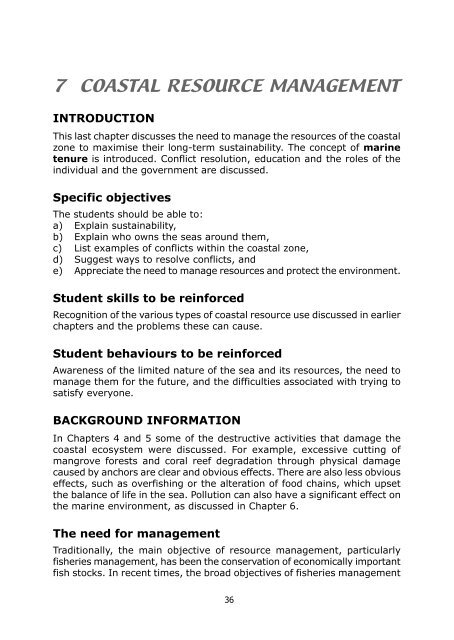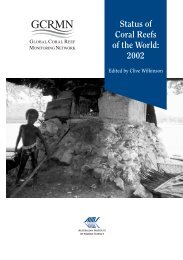A School Teachers Guidebook to Marine Environmental Education ...
A School Teachers Guidebook to Marine Environmental Education ...
A School Teachers Guidebook to Marine Environmental Education ...
Create successful ePaper yourself
Turn your PDF publications into a flip-book with our unique Google optimized e-Paper software.
SCHOOLTEACHER’S GUIDE TO MARINE ENVIRONMENTAL EDUCATION<br />
7 COASTAL RESOURCE MANAGEMENT<br />
INTRODUCTION<br />
This last chapter discusses the need <strong>to</strong> manage the resources of the coastal<br />
zone <strong>to</strong> maximise their long-term sustainability. The concept of marine<br />
tenure is introduced. Conflict resolution, education and the roles of the<br />
individual and the government are discussed.<br />
Specific objectives<br />
The students should be able <strong>to</strong>:<br />
a) Explain sustainability,<br />
b) Explain who owns the seas around them,<br />
c) List examples of conflicts within the coastal zone,<br />
d) Suggest ways <strong>to</strong> resolve conflicts, and<br />
e) Appreciate the need <strong>to</strong> manage resources and protect the environment.<br />
Student skills <strong>to</strong> be reinforced<br />
Recognition of the various types of coastal resource use discussed in earlier<br />
chapters and the problems these can cause.<br />
Student behaviours <strong>to</strong> be reinforced<br />
Awareness of the limited nature of the sea and its resources, the need <strong>to</strong><br />
manage them for the future, and the difficulties associated with trying <strong>to</strong><br />
satisfy everyone.<br />
BACKGROUND INFORMATION<br />
In Chapters 4 and 5 some of the destructive activities that damage the<br />
coastal ecosystem were discussed. For example, excessive cutting of<br />
mangrove forests and coral reef degradation through physical damage<br />
caused by anchors are clear and obvious effects. There are also less obvious<br />
effects, such as overfishing or the alteration of food chains, which upset<br />
the balance of life in the sea. Pollution can also have a significant effect on<br />
the marine environment, as discussed in Chapter 6.<br />
The need for management<br />
Traditionally, the main objective of resource management, particularly<br />
fisheries management, has been the conservation of economically important<br />
fish s<strong>to</strong>cks. In recent times, the broad objectives of fisheries management<br />
36
















